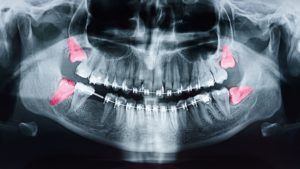Wisdom Tooth Woes: Why Do They Hurt?
February 12, 2024

Have you been experiencing aches behind your molars or red, inflamed gums in the back of your mouth? If so, you may have developed an issue with your wisdom teeth. Typically, these molars arrive when you’re between 17 and 26 years old after your other teeth have already erupted. They’re not necessary for your survival, though, so it’s not uncommon for your dentist to recommend extracting them if they’re giving you problems. If your wisdom teeth are throbbing and you’re not sure what to do, keep reading to learn more about why this happens!
Why Do My Wisdom Teeth Hurt?
Understanding why your wisdom teeth are tender can help pinpoint the cause so you can address it appropriately. Several underlying causes can leave your newest pearly whites feeling raw, including:
- Growing pains. Your wisdom teeth may push against their neighbors as they make their way through your gums which can cause a sore mouth and jaw.
- Impacted tooth. These back molars often grow crookedly or only partially erupt from your gums. This can lead to an uncomfortable infection that gets worse when you bite down or chew.
- A cyst. If your teeth are impacted, a cyst (a pocket of infection) can develop around the tooth’s roots.
- Tooth decay. Because wisdom teeth are located behind your other molars, it can be challenging to reach them for consistent brushing twice daily. They’re more likely to develop cavities as a result.
- Gum disease. It’s just as difficult to floss your wisdom teeth as it is to brush them which leaves you with an increased risk of gum disease.
How Can I Relieve Wisdom Tooth Pain?
Fortunately, you don’t have to live with your wisdom toothache forever. There are several proactive things you can do to help yourself, like:
- Use an anti-inflammatory medication. It’s usually safe to take over-the-counter drugs like Tylenol or ibuprofen to address swelling and discomfort.
- Apply a cold compress. Holding an ice pack to that side of your face can create a temporary numbing effect.
- Call your dentist. Let your provider know what’s happening so they can schedule you for an examination. From there, they can let you know whether your wisdom teeth need to be extracted. Because they’re considered vestigial (no longer necessary), removal is often the simplest solution.
Once your dentist identifies the problem, they can recommend appropriate treatments. You’ll be pain-free and back to life as usual before you know it!
About the Practice
At Rubal Dentistry, patients benefit from a wide range of services provided by two compassionate experts with decades of experience between them. They take the time to get to know your unique dental goals and needs and work cohesively to provide individualized treatments to meet them. By staying on top of the most recent advancements in technology and techniques, they offer only the most up-to-date solutions. If you’re in pain or are concerned about your wisdom teeth, you’re welcome to request an appointment on the website or by calling (817) 444-2585.
No Comments
No comments yet.
RSS feed for comments on this post.
Sorry, the comment form is closed at this time.
